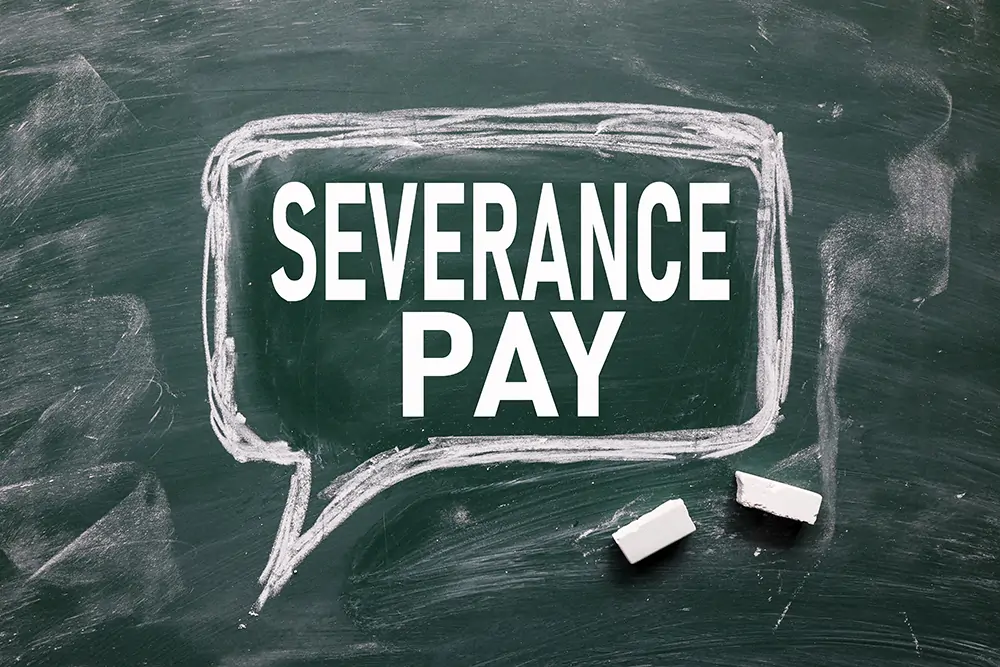Losing your job can be a challenging experience, so it’s important to understand your rights during this difficult time. One key aspect that is often misunderstood is severance pay. In this blog post, we will clarify Ontario’s severance pay guidelines, explain their implications, and discuss the factors that can affect your entitlements.
What is Severance Pay?
Severance pay is a fair compensation provided to employees whose employment has been “severed.” It’s designed to help employees financially as they transition to new employment. In Ontario, severance pay is mandated by the Employment Standards Act (“ESA”), which sets out minimum requirements for employers.
Ontario’s Severance Pay Chart
The Ontario Severance Pay Chart outlines the minimum severance pay requirements under the ESA. It shows how much severance pay an employee is entitled to based on their years of service:
| Years of Service | Severance Pay |
| 5 years | 5 weeks |
| 6 years | 6 weeks |
| 7 years | 7 weeks |
| 8+ years | Up to 26 weeks |
Who is Entitled to Severance Pay?
Not all employees are eligible for severance pay. To qualify, an employee must meet the following criteria:
- Length of Service: The employee must have worked for the employer for at least five (5) years.
- Employer Size: The employer must have a global payroll of at least $2.5 million or have terminated the employment of 50 or more employees in a six-month period due to a permanent closure of all or part of the business.
How is Severance Pay Calculated?
Under the ESA, severance pay is calculated using the following formula:
Regular weekly wages × Years of service
The maximum amount of severance pay required under the ESA is 26 weeks’ pay.
Do I need to go to court if I am owed severance?
If you believe you’re entitled to more severance than offered, the first step isn’t necessarily court action. Typically, the process begins with a formal demand letter. This letter, usually drafted by an experienced employment lawyer, outlines:
- The circumstances of your termination
- Any severance or termination pay already offered
- Your case for additional compensation
This letter initiates a negotiation process between your severance lawyer and your former employer. Often, these negotiations can lead to a satisfactory settlement without court involvement.
However, if these discussions don’t result in an agreement, the next step might be filing a formal legal complaint. This action would start the litigation process, potentially leading to a court hearing.
It’s important to note that many severance disputes are resolved through negotiation, mediation, or settlement conferences before reaching a courtroom. Legal action is usually a last resort when other resolution methods have been exhausted.
Severance Pay vs. Termination Pay
Severance pay is not the same as termination pay.
Termination pay is compensation for the notice period an employer should have given an employee before termination. If terminated without cause, all employees who have been with an employer for at least three months are entitled to termination pay.
Do not sign a severance pay release until you know your rights
When you’re leaving a job, taking your time before signing any severance agreements is advisable. While your employer might suggest their offer is the best you can get, verifying this independently is important.
Key points to remember:
- Resist any pressure to sign immediately. You have the right to review the offer carefully.
- The initial offer may not reflect your full entitlements under the law or your employment contract.
- Consult with an employment lawyer who can review your severance package. They can help ensure you’re not leaving money on the table.
- Severance isn’t just about money. Look at benefits, stock options, and other perks that might be negotiable.
- Signing a release often means giving up your right to pursue further claims against your employer.
A hasty decision now could cost you significantly in the long run. Take the time to understand and potentially negotiate your severance package fully. Your financial future may depend on it.
Why Seek Legal Advice
Given the complexity of severance calculations and the potential for much larger payouts under common law, it’s highly advisable to seek legal counsel when facing termination. An experienced employment lawyer can help ensure you receive your full entitlements, which may be substantially more than the ESA minimums.
Takeaway
Specific entitlements upon termination of employment may vary based on individual circumstances, employment contracts, and applicable laws. It’s advisable to consult with an employment lawyer to understand your particular situation.
Before signing any release, in most circumstances, it’s strongly advised to consider contacting an employment lawyer. Contact Sultan Lawyers online or by telephone at 416-214-5111 to ensure you’re not leaving any potential compensation on the table.
Frequently Asked Questions
Q: How do I know if I am eligible for severance pay?
A: Check if you have worked for your employer for at least five years and if the employer meets the size requirements.
Q: Can my employer deny me severance pay?
A: Yes. If you are terminated for just cause, you are not entitled to severance pay.
Q: What should I do if I believe I am entitled to more severance pay than offered?
A: Consult with an employment lawyer to evaluate your situation and discuss potential entitlements.
Your Case: Our Priority.
At Sultan Lawyers PC, we are the only firm specializing exclusively in employment and immigration law. Whether your case is straightforward or complex, we have the experience and commitment to achieve the best possible outcome. Trust us to navigate the toughest challenges with you.



